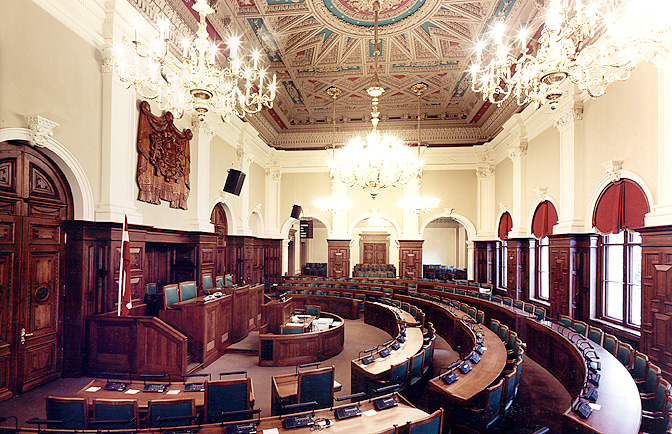
After Elections, Latvia Can Have a Latvian Government Again (Part Two)
Publication: Eurasia Daily Monitor Volume: 8 Issue: 176
By:

All three of Latvia’s Western-oriented parties together won the September 17 parliamentary elections on the basis of a common set of values: commitment to NATO and the EU, market economics, and consolidation of the Latvian society in the Latvian state. As in any multiparty system, these three parties differed from each other on the nuances, but acted as natural allies on the fundamentals, in the parliament before elections and in the electoral campaign just held (“After Elections, Latvia Can Have a Latvian Government Again,” EDM, September 23).
These three parties defeated an emergent common front of the leftist Russian party Harmony Center and Latvian oligarchic business. This alignment was rapidly developing in the spring and summer of 2011, defeating the government and then-President, Valdis Zatlers, in a series of parliamentary votes. It threatened to shift the balance of political and social forces toward a new alliance: that between Latvian oligarchic business and the mass of local Russian voters, the single largest electoral bloc in the country. Such an internal shift would correspondingly have shifted the country’s external orientation, toward a middle course between the West and Russia. The outgoing President Zatlers and the Western-oriented parties recognized that danger and precipitated new parliamentary elections.
Zatlers’s Reform Party, the Unity Party, and the National Alliance-All for Latvia jointly won the elections in the technical sense, but Latvia itself is the strategic winner as a state and nation. Consequently, Harmony Center and Moscow policy planners seek to reverse the elections’ result by splitting the Latvian parties and bringing the Russian party as the single largest one in a new governing coalition. Moscow “political technologists” (e.g., Aleksei Makarkin in Kommersant, September 19) hope and even expect that “the West” would advise Latvia to do this.
Harmony Center won first place in these elections with only 28 percent of the votes cast, reflecting the Russian/Russian-speaking monolithic voting, versus Latvians’ pluralistic voting. Harmony holds 31 seats in the 100-seat parliament, versus 56 seats held by the three election-winning parties for an absolute majority. This lopsided difference is not simply arithmetical, but one of deep values and principles. Harmony Center’s electoral campaign starkly reflected this gap.
Bringing Harmony into a new coalition government (and sacrificing some Latvian parties and groups on the altar of such a deal) would, therefore, look cynical to many Latvian voters. It would, however, delight Moscow on two levels. First, such a deal would insert a Russia-oriented party into the Latvian state’s decision-making processes and confidential information circuit (including that plugged into NATO and the EU). Second, it would help Russia discredit the concept of democracy in Latvia, if the election’s outcome is promptly reversed in a deal among a few politicians at the top. The election-winning parties had campaigned against backroom deals among oligarchic parties, and between these and Harmony, as undemocratic.
Both of those negative consequences could be long-lasting. In the short term, bringing Harmony Center into Latvia’s government would gratify the Kremlin, amid Russia’s own parliamentary and presidential elections. The Kremlin has long used the “Russian issue” in Latvia for nationalist propaganda within Russia itself. Harmony enjoys close relations with the United Russia party in a partnership agreement (the likely covert relations below this iceberg’s tip are, inexplicably, being kept out of public discussion in Latvia and the West). A power-sharing arrangement for the Russian party in Latvia would be a trophy for Russia’s president, prime minister, and party of power to show in their electoral campaign.
To facilitate a post-election agreement in its favor, Harmony Center understands the need for some re-branding. On September 16, the party’s board chairman and mayor of Riga, Nil Ushakov, acknowledged to participants at the international Riga Conference – a prestigious annual event – that Latvia had in 1991 “restored its independence after the Soviet occupation” (BNS, September 17). Ushakov’s use of the term “occupation” is unprecedented for a Russian politician in Latvia, and seemingly a psychological revolution for him. He uttered this sentence under challenge in front of a predominantly foreign audience, and it remains to be seen how his party will deal with this issue.
In the election’s aftermath it presents itself as “social-democrat” rather than leftist, and as a “multi-ethnic” rather than merely a Russian party. None of these labels correspond with the content, however (BNS, Delfi, LETA, September 19-23).
Harmony has been using leftist rhetoric to attract Russian voters, but in fact made common cause with Latvian oligarchic business. Harmony was hoping eventually to enter the Latvian government with oligarchic support, in a partnership of business interests with Russia. The “multi-ethnicity” label cannot obscure the fact that Harmony’s electoral base is co-terminous with the Russian/Russian-speaking electorate. The term “Russian-speaking” (Moscow’s and Harmony’s own term) continues the Soviet-era russification of all ethnic minority groups (in Latvia’s case these include Ukrainians, Belarusians, Poles, Jews), reducing them to mere “Russian-speakers” as a device to exacerbate Russian-Latvian polarization.




